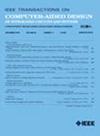FTCD: Fault-Tolerant Co-Design of Flow and Control Layers for Fully Programmable Valve Array Biochips
IF 2.7
3区 计算机科学
Q2 COMPUTER SCIENCE, HARDWARE & ARCHITECTURE
IEEE Transactions on Computer-Aided Design of Integrated Circuits and Systems
Pub Date : 2025-01-03
DOI:10.1109/TCAD.2025.3525615
引用次数: 0
Abstract
As a new generation of flow-based microfluidics, fully programmable valve array (FPVA) biochips have gained widespread adoption as a biochemical experimental platform, thanks to their enhanced programmability and flexibility. Environmental and human factors, however, often introduce physical faults during the manufacturing process, such as channel blockage and leakage, which, undoubtedly, can affect the results of bioassays and even cause execution failure. In this article, we focus on the fault-tolerant co-design of flow and control layers in FPVA biochips for the first time. For the flow layer, three dynamic fault-tolerant techniques, i.e., a cell function conversion method, a bidirectional redundancy scheme, and a fault mapping method, are presented and integrated into the device placement and flow routing stages. As a consequence, we further realize an efficient and effective fault-tolerance-oriented physical design method, thus ensuring the robustness of chip architecture and correctness of assay outcomes. For the control layer, we design another three fault-tolerant techniques, including a series duplication scheme of leakage valves, allocation and merging rules of backup valves, and a logic conflict-aware adjustment strategy of redundant architecture. Based on these techniques, we construct a fault-tolerant control system to realize dynamic recovery of control signals. Experimental results on multiple test cases demonstrate that the proposed method can produce optimized fault-tolerant FPVA architectures with low-fabrication cost, high-execution efficiency, and high-fault-tolerance success rate.全可编程阀阵列生物芯片流程和控制层的容错协同设计
全可编程阀阵列(FPVA)生物芯片作为新一代基于流动的微流控技术,由于其增强的可编程性和灵活性,在生化实验平台上得到了广泛的应用。然而,环境和人为因素经常在制造过程中引入物理故障,例如通道堵塞和泄漏,这无疑会影响生物测定的结果,甚至导致执行失败。本文首次对FPVA生物芯片中流程层和控制层的容错协同设计进行了研究。对于流层,提出了三种动态容错技术,即单元函数转换方法、双向冗余方案和故障映射方法,并将其集成到设备放置和流路由阶段。因此,我们进一步实现了一种高效且有效的面向容错的物理设计方法,从而确保了芯片架构的鲁棒性和分析结果的正确性。在控制层,我们设计了另外三种容错技术,包括泄漏阀的串联复制方案、备用阀的分配和合并规则以及冗余结构的逻辑冲突感知调整策略。在此基础上,构建了容错控制系统,实现了控制信号的动态恢复。在多个测试用例上的实验结果表明,该方法可以产生优化的容错FPVA架构,具有制造成本低、执行效率高、容错成功率高等特点。
本文章由计算机程序翻译,如有差异,请以英文原文为准。
求助全文
约1分钟内获得全文
求助全文
来源期刊
CiteScore
5.60
自引率
13.80%
发文量
500
审稿时长
7 months
期刊介绍:
The purpose of this Transactions is to publish papers of interest to individuals in the area of computer-aided design of integrated circuits and systems composed of analog, digital, mixed-signal, optical, or microwave components. The aids include methods, models, algorithms, and man-machine interfaces for system-level, physical and logical design including: planning, synthesis, partitioning, modeling, simulation, layout, verification, testing, hardware-software co-design and documentation of integrated circuit and system designs of all complexities. Design tools and techniques for evaluating and designing integrated circuits and systems for metrics such as performance, power, reliability, testability, and security are a focus.

 求助内容:
求助内容: 应助结果提醒方式:
应助结果提醒方式:


